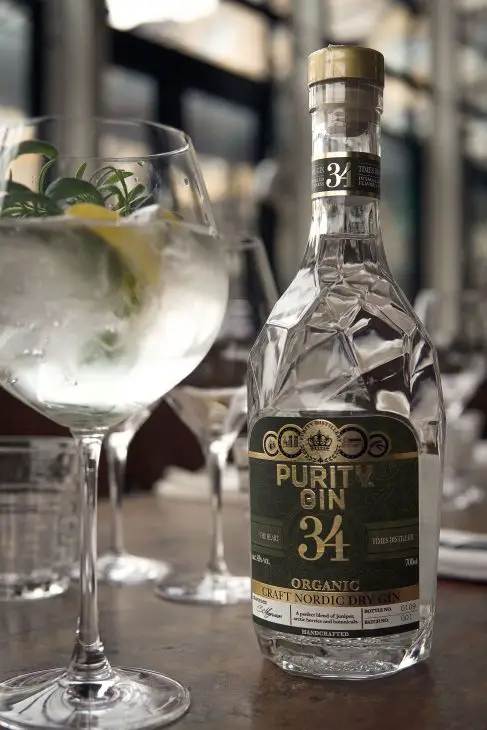Hey there! This site is reader-supported and we earn commissions if you purchase products from retailers after clicking on a link from our site.
As much as we love beer here at Sound Brewery, there is something to be said for a refreshing gin and tonic. And nothing makes gin more fantastic when it has been stored the correct way. Because, as you already know with homebrewed beer, storing alcohol the right way is essential. Otherwise, you mess with the flavor and constitution. The end result? Disappointment.
So if you want to keep that bottle gin flavorful, you need to know about the relationship gin wants to have with your freezer.
Does Gin Go Bad?
Gin might get bruised easily when you shake it, but it is stable in the bottle. You can leave a bottle of unopened gin unattended for many years and never have to worry about it losing flavor.
However, if the bottle is open, that’s a different story. An opened gin bottle should be used within a year. No, the gin won’t go off, but once the seal is broken, the flavor could worsen.
How Long Does It Take For Gin to Go Off?
Okay, so we already said that you should drink that open gin within a year, but does it go bad that fast? Generally, opened gin can still last for years without going off. You can’t store it in direct sunlight or next to a source of heat, however.
The reason gin goes bad slowly once it’s open is because of oxygen exposure. Gradually, oxygen trapped in the unsealed bottle will react with the distilled alcohol. Try to finish the bottle within 2 years for the best experience.
Now, that is only true for pure gin. Any gin that is flavored with natural ingredients or mixed with a liqueur will lose flavor and quality within a few months.

The Right Way to Store Gin
Should gin remain in a dark place out of the sun? Should gin be chilled? These are some pressing questions. Turns out, many of us have stored gin completely wrong. Gin should be kept in the fridge. Surprise!
Yes, gin is best served cold, meaning it deserves a home in your fridge or freezer. If you want to keep the gin out of the fridge for a bit, be sure to sit the bottle in a bucket of ice. That will keep it chilled long enough for you to mix up a couple of cocktails.
You can store gin in a dark, cool place, like your alcohol cabinet, but don’t serve it at room temperature. That’s a mistake you will most likely regret. Warm gin makes the alcoholic content more severe and, therefore, far less enjoyable to drink. Unless you’ve whipped up a Hot Toddy! Instead, chill the bottle as recommended before enjoying.
Now for a caveat: Never store gin with a pourer attached. Even if you store it the right way, the pourer will introduce air to the gin. Interestingly, alcohol evaporates at a faster rate than water. Your gin will be weak by the time you get around to drinking it again.
Can You Put Gin in the Freezer?
Don’t have room in the refrigerator? No worries. Gin likes cold places, so you can also place it in the freezer without any worries. Since gin is 37.5% alcohol by volume (ABV) and the typical freezer is around 0°F (18°C), there is also a very low chance of the liquid freezing and making a mess in your freezer.
Remember those gin liqueurs we mentioned? Those should not be put in the freezer. Pure gin only! Gin liqueurs or those with natural infusions have less alcohol (around 20% ABV), making them weaker and more easy to freeze. The unfiltered gin varieties that have particles floating around could also partially freeze or be altered by the low temperature.
Straight from the gin distillers mouth:
Can You Defrost Gin?
Having done good by your gin and putting it in the freezer or fridge, you might be concerned when frost forms all over the bottle. Sometimes the distilled alcohol also gets a bit frosty, especially if there is more than just gin in the bottle. Never fear! You can remove the bottle from the freezer, put it in the fridge or countertop, and let it defrost.
Will it taste the same? Unless your gin or gin liqueur has spent years in the freezer, it should be fine to drink.
Wrapping Up
Can you freeze gin? Should you? Yes! Whether you want a chill martini that hasn’t been diluted from ice or just want to bring out the character of the gin, storing the alcohol in the fridge or freezer is a great move. Give it a try and tell us what you think!

FAQs About Freezing Gin
If your gin has frozen, there are a couple of things you need to ask yourself. First, what temperature did you set the freezer to? Because gin shouldn’t freeze until -17°F (27°C). Second, if your gin froze, it might not be the highest quality. Gin that has been diluted with water or has a low alcohol content will thicken in freezing temperatures or even completely freeze.
No, Freezing alcohol won’t ruin the alcohol content. You don’t have to worry about pulling frozen wine or gin from the freezer and end up with less alcohol. Freezing temperatures causes no chemical change in alcohol. However, the characteristics (flavor, scent, mouthfeel) of the alcoholic beverage, be it gin, wine, beer, or something else, could change slightly.
Pure gin will not freeze unless the temperature goes below -17°F (27°C), so you usually don’t have to worry about storing gin in the freezer.
Freezing a gin and tonic might sound like a challenge. First, gin doesn’t usually freeze in a typical household freezer. Second, tonic is full of carbonation, which doesn’t freeze, and it usually loses its flavor. If you want to freeze a gin and tonic for maybe a slush or freezer pops, you’re going to need tonic syrup, not tonic water. It takes about 6-10 hours for the mixture to become a slush. Overnight for a fully frozen treat.

